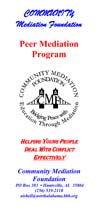Peer Mediation
What Is Peer Mediation?
 Peer mediation is a quick and efficient way to resolve disputes. It allows students the opportunity to solve their own problems by encouraging effective solutions. In addition it allows:
Peer mediation is a quick and efficient way to resolve disputes. It allows students the opportunity to solve their own problems by encouraging effective solutions. In addition it allows:
- A chance to be heard
- A chance to develop new ways of thinking
- A chance for the parties to develop their own solutions
What Is A Peer Mediator?
A peer mediator helps the people involved in a dispute talk with each other about the conflict so each party can better understand why the conflict exists. As the facts and circumstances concerning the dispute are brought into the open, the mediator works with the parties to help discover possible ways the conflict can be resolved.
The mediator manages the mediation session but does not decide what should be done to solve the problem. The people involved in the dispute decide for themselves what actions will occur, time frames, and other important details. The agreement is written by the mediator with the help of the parties, and is signed by all parties to the dispute.
Peer Mediation Resources
 Peer Mediation Program - Helping Young People Deal With Conflict Effectively - A brochure (pdf format) put together by Anne Isbell of the Community Mediation Foundation.
Peer Mediation Program - Helping Young People Deal With Conflict Effectively - A brochure (pdf format) put together by Anne Isbell of the Community Mediation Foundation.
 Peer Mediation - Win Win Problem Solving for Students and Adults, by Anne Isbell - A PowerPoint presentation on Peer Mediation put together by Anne Isbell of the Community Mediation Foundation. Contact aisbell@northalabama.bbb.org.
Peer Mediation - Win Win Problem Solving for Students and Adults, by Anne Isbell - A PowerPoint presentation on Peer Mediation put together by Anne Isbell of the Community Mediation Foundation. Contact aisbell@northalabama.bbb.org.
- View Peer Mediation Video
- Shape up your schools with peer mediation. This video was produced by
the Dispute Resolution Service at the Los Angeles County Bar.
Alabama Success Story
Discovery, Liberty middle school students learn how to resolve disputes
By REBECCA SALLEE
Reprinted from the Madison Spirit, sallee@comcast.net
You're minding your own business at the middle school lunch table when suddenly the girl across from you spits Mountain Dew all over you.
And you're mad. That girl has had it out for you ever since first grade.
But she insists it was an accident that happened when the person next to her said the punchline of a joke just as she took a swig of soda.
How to resolve the situation? It's a job that may be best settled by peer mediators.
Students from Discovery and Liberty middle schools in Madison recently took part in a training session to help peers in crisis.
Anne Isbell, executive director of the Better Business Bureau's Community Mediation Foundation, led the session, which involved about 20 students from both schools. Madison DONT (Drugs Offer No Tomorrow) paid for it.
Melissa Feehan, counselor at Discovery, said the program is in its fourth year at her school, where 13 mediators will work to resolve differences among their fellow students. Nine students are involved at Liberty, said counselor Patty Piro. Although the numbers are hard to pin down, the program usually addresses about four incidents a month, Feehan said.
"It could be (something that happens) in the hall. Maybe they have a conflict in P.E. Pushing or shoving going on and it's kind of blown out of proportion," she said. "More often than not, it's something small that if left alone will escalate."
Students are referred to peer mediation by school discipline administrators, she said.
The mediators are volunteers who apply for their positions through their guidance counselors. They must be recommended by a teacher and must show an aptitude for counseling others in their answers to an initial questionnaire.
Character is an important quality for peer mediators, who must also be in good academic standing, Feehan said.
Mediation sessions are scheduled around academic classes and are conducted only if all parties -peers and mediators -agree to the terms.
Isbell trains students throughout Alabama and also conducts conflict management training for small businesses.
Role-playing is an important method for training middle schoolers in mediation, so four students demonstrated a possible scenario for others in the audience based on the aforementioned Mountain Dew-spitting episode. "You really feel that she wants to spit on you out of disrespect," said the boy pretending to lead the mediation session.
"I was drinking my soda, and my friend told me a joke," said the girl accused of starting the problem. "I accidentally spit some on her. She thought that I did it on purpose, and no I didn't."
Isbell explained to the group that even with adults, problems as small as that can become larger than life if they aren't addressed and handled promptly and gingerly.
Signs in front of the group served to remind the mediators of the importance of taking each incident seriously: "Understanding Different Perceptions is Vital to Resolving Conflict" and "Stop: Anger is One Letter Short of Danger."
Piro pointed out the importance of an apology, even when one isn't necessarily warranted. "The real strong stubborn person says 'I am not going to apologize because I didn't do anything wrong,' " she said.
Isbell suggested students begin brain-storming in such a case and ask both parties how they do intend to resolve the problem. "Deep feelings. Lots of questions. That's what we call underlying issues," she said. "You want to help them resolve the issues within themselves, not just on the surface."
__________
Need help with PDF or PowerPoint files?
Visit our software assistance page to download the Free Adobe Reader software.
